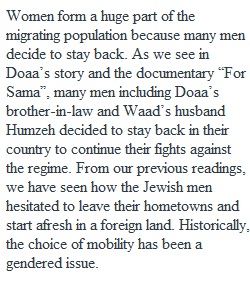


Q 1. Bassem and Doaa ultimately decide “it’s better to have a quick death at sea than a slow death in Egypt.” How do the families in For Sama and A Hope More Powerful Than the Sea struggle with the question of whether to stay or to flee? What are their considerations? Discuss specific examples from both the film and the book in your response. 2. Consider the points raised from our Cohn readings and from the lecture on the Giles article, “Women Forced to Flee”: Why and how is mobility a gendered issue for forced migrants? In some ways, Doaa and her family were very fortunate because her father was able to flee with the family, and there were kind men with resources who help protect the family at key moments in their journey (for example, the uncle who pays the bribe to cross into Jordan, or Khalid the hotel owner in Egypt who lets them stay for free in the off-season). But what if we imagine, what would have happened to Doaa’s family had something happened to her father? Or if Bassem hadn’t come along and paid for Doaa’s medical care when she was seriously ill? Or if Doaa’s miraculous survival had not led to so much media attention and she just landed in Italy alone? How does gender matter in the migration story of Doaa and her family?
View Related Questions